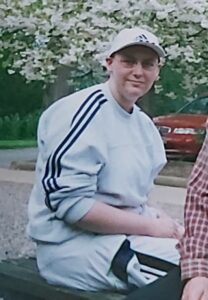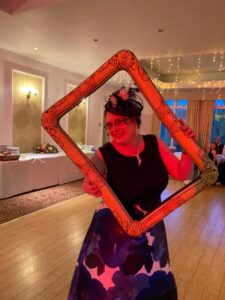
10 Jan 2025
“Wow, I went through all that”: Marion’s story
At 17, Marion McIntosh’s life was typical for her age – enjoying college and spending time with friends and family in Kelso, Scottish Borders. She was in her second year of studying Travel & Tourism, and life was full of potential. But suddenly her health began to decline.
“I couldn’t climb stairs without feeling like I might collapse,” recalls Marion, now 42. “My best friend Naomi urged me to see a GP in March 2000 when I started vomiting. They performed a blood test told I was severely anaemic and needed to go to the hospital immediately.”
Marion and her parents rushed to Borders General Hospital in Melrose, where she was given a blood transfusion to help with the anaemia. The next day Marion was informed that she needed a bone marrow biopsy.
 “It was terrifying. Even though I had studied biology, I didn’t realise they might be checking for something more severe than anaemia. But my parents did. They knew it was serious; otherwise, I wouldn’t have been admitted to the hospital.”
“It was terrifying. Even though I had studied biology, I didn’t realise they might be checking for something more severe than anaemia. But my parents did. They knew it was serious; otherwise, I wouldn’t have been admitted to the hospital.”
In March 2000, Marion was diagnosed with acute myeloid leukaemia (AML).
“At first, the gravity of the diagnosis didn’t sink in. One moment I was planning a trip to Paris as part of my coursework; the next, I was facing aggressive leukaemia. My parents had to break the news to my siblings, who were shocked.”
The following day, Marion was transferred to the Western General Hospital in Edinburgh and started chemotherapy immediately.
“Treatment was tough. I remember the doctors saying they had to refer back to their textbooks to find a solution because I was allergic to everything. I was kept in isolation through the entire process as I was at very high risk of infection. This was a very lonely experience for me.”
Life changed drastically. The hospital was 50 miles from home, but Marion’s parents or other family members visited daily.
“I was 17 but felt very young. The nurses encouraged me to read or play games, but I was too angry at my situation. Music also helped me cope. A song that always takes me back to that time is ‘Silence’ by Delerium.”
Marion was hospitalised from March 2000 until January 2001, with only brief home visits between chemotherapy rounds. For Marion’s 18th birthday she could only have a small gathering with family at home due to the risk of infection.
“I had to leave college as I was too ill, and keeping in touch with friends was challenging as this all happened before mobile phones became a thing. My best friend visited as much as possible.”
Marion underwent five rounds of chemotherapy, total body irradiation (TBI), and a bone marrow transplant using her own marrow in November 2000. This method is usually used for patients who are already in remission. Research has shown that stem cells from donors are more likely to help prevent leukaemia from returning. In an ‘autologous’ stem cell transplant the patient’s own cells are taken from the blood or bone marrow, frozen, and stored while the patient undergoes high-dose chemotherapy or radiation. Sometimes, the cells are treated in the lab to remove cancer cells. After treatment, the stored stem cells are thawed and returned to the patient’s bloodstream to help restore their bone marrow.
“Losing my hair was a shock, but I eventually asked a nurse to shave it all off to make it less traumatic. I got to choose a wig to wear, think I only wore it twice – it was uncomfortable and itchy and I preferred to wear a baseball cap.”

After two years of recovery, Marion regained her strength and in 2006, she was declared in remission. Today she continues to be monitored every year but remains healthy. She now works in the care sector looking after adults with complex learning disabilities. But outside of work Marion found a passion for helping others by becoming a Cub Leader in 2002 and then moving into the Scouts.
“Scouting gave me something to focus on during my recovery. I stayed involved for 18 years and not only did this help me to get back on my feet but I enjoyed giving young people the opportunity to do things they wouldn’t get to do anywhere else.
“I’m grateful for the treatment and research that saved my life. Although it’s been nearly 25 years, the experience still feels close to home. Most days I don’t think about it, but sometimes it hits me and I think ‘Wow, I went through all that’.”
Related posts
2 August 2023
Friends and family of Leicestershire woman who died from rare cancer campaign for more research and awareness
The family of a Leicestershire woman who died in July 2022, on the day of her leukaemia diagnosis, has raised over £17,000 in her memory to support Leukaemia UK. On…
16 November 2023
Leukaemia UK appoints Hannah Peckham as newest Ambassador
Leukaemia UK has today announced its appointment of award-winning children’s book author, Hannah Peckham, as its newest celebrity Ambassador. Hannah joins the likes of actor Dougray Scott, celebrity chef Francesco…
13 March 2024
Leukaemia UK launches manifesto to demand better for those affected by leukaemia
Leukaemia UK has today launched its manifesto to demand better for those affected by leukaemia. The manifesto calls on the next government to save and improve the lives of those…
15 June 2018
MP opens Leukaemia UK Ambulatory Care Unit
A unit funded by Leukaemia UK which allows people with blood cancer to have stem cell transplants as out-patients has been officially opened by its first patient, Nick Boles MP